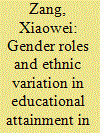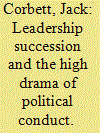|
|
|
Sort Order |
|
|
|
Items / Page
|
|
|
|
|
|
|
| Srl | Item |
| 1 |
ID:
135109


|
|
|
|
|
| Summary/Abstract |
Using survey data (n = 1,600) collected in Ürümchi in Xinjiang, China, this paper examines the Han-Uyghur gap in schooling and offers a nuanced account of educational stratification by ethnicity in urban China. Data analysis shows that Han Chinese are more likely than Uyghurs to receive schooling, and the ethnic variation persists when holding main background characteristics constant. However, the differences in schooling between Han and Uyghur men fade away when background characteristics are controlled for, whereas no similar patterns are found among women. Gender roles account for both ethnic parity in schooling between Han and Uyghur men and ethnic inequality in schooling between Han and Uyghur women, which underlies the overall Han-Uyghur gap in educational attainment in Ürümchi.
|
|
|
|
|
|
|
|
|
|
|
|
|
|
|
|
| 2 |
ID:
135115


|
|
|
|
|
| Summary/Abstract |
Politicians in the Pacific Islands are regularly accused of corruption and yet, paradoxically, they also tend to be the most vocal public commentators when incidents of misconduct arise, with accusation and counter-accusation all part of the political theatre. Given their central role in these debates, we ask how politicians interpret political conduct. Based on interviews and public comments, we explore the meanings and beliefs that politicians in Samoa ascribe to three interrelated cases where the actions of their colleagues are under scrutiny. We find a series of divergent and conflicting views. We add to the literature on corruption, both in the Pacific and more generally, by showing how questions about conduct not only vary according to context but are invariably rooted in the cut and thrust of everyday politics, which in this case is dominated by the question of leadership succession.
|
|
|
|
|
|
|
|
|
|
|
|
|
|
|
|
| 3 |
ID:
135110


|
|
|
|
|
| Summary/Abstract |
Since the 1980s, maternal mortality in Indonesia has declined. However, it has always been high by regional standards, and its decline is now stalling. This makes it unlikely that by 2015 Indonesia will have reduced maternal mortality to the level set by the fifth United Nations Millennium Development Goal.
In Indonesia, the role of the traditional birth attendant (TBA) in childbirth has been the subject of debate and controversy since colonial times. In efforts to reduce maternal mortality, subsequent health administrations have tried to replace TBAs with modern-trained midwives. Contrary to expectations, however, even in the present era certified midwives have not fully replaced TBAs. Particularly in rural areas, the TBA remains a key actor in birthing care, although now more often in collaboration with the modern midwife.
Taking an anthropological and a historical perspective, the involvement of the TBA in birthing and maternal care, at different times and in different areas of Indonesia, is investigated and, where relevant, compared to that of TBAs in other parts of Southeast Asia. The emergent picture does not support the opinion that the TBA is to blame for high maternal mortality. Poor referral facilities, bad infrastructure and insufficient means are the more likely causes. To resolve the maternal mortality problem, governmental health policies should treat the TBA as an ally. However, such policies, and promising approaches such as partnerships and village maternity houses, can only be effective when their implementation is adequately backed up by resources.
|
|
|
|
|
|
|
|
|
|
|
|
|
|
|
|
| 4 |
ID:
135112


|
|
|
|
|
| Summary/Abstract |
A large part of civil society in Japan, and migrant support groups in particular, has been described as apolitical and service oriented, being strong in generating social capital but weak in advocacy or lobbying politics. Developments preceding the 2009 reform of immigration policies in Japan call for qualifying this assessment. While the majority of migrant support groups is active on the local level, some have formed a national umbrella organization that has formulated policy proposals, acted as an external advisor in the policy issue_image_87_4_interns_Kremersmaking process and build networks with foreign governments, international organizations and NGOs. They engaged in agenda setting and influenced the way in which migration and NGOs themselves are framed in the Japanese mass media. This I will show in a case study on advocacy organizations involved in the recent reform of Japan’s Technical Intern Training Program (TITP) for foreigners. By focusing on a political process rather than a set of organizations, this paper not only observes transnational advocacy networks in the making, but also gives an accurate evaluation of their political impact and explains its factors. Migrant advocacy organizations informed an international public and were able to change the attitude of other political actors and interest groups and as a result tipped the scales in the policy making process.
|
|
|
|
|
|
|
|
|
|
|
|
|
|
|
|
|
|
|
|
|